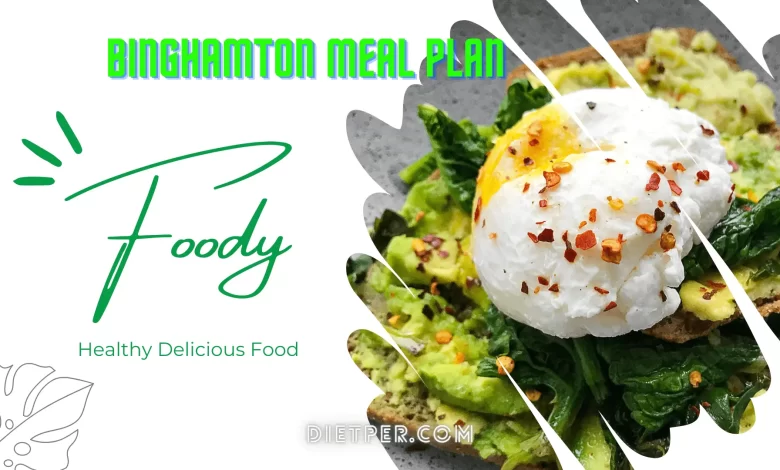The Binghamton Meal Plan 2023 : What To Eat Or Avoid To Eat
Binghamton Meal Plan: Sustenance and Beyond

Binghamton Meal Plan: In the heart of the academic journey at Binghamton University lies a nourishing experience that extends beyond the classroom walls. The Binghamton Meal Plan is not just a mere arrangement of meals; it’s a carefully crafted program that elevates the campus experience to new heights. It’s a gateway to culinary exploration, a canvas for connection, and a platform for fostering well-being in the bustling world of academia.
As students embark on their path of growth and discovery, the Binghamton Meal Plan is an integral part of their daily lives. It’s more than sustenance; it’s a tapestry woven with flavors, choices, and community connections. From nourishing the body to nurturing social interactions, the meal plan is a vital thread that weaves through the fabric of the university experience.
Join us on a journey of exploration as we delve into the diverse offerings, the culinary adventures that await, and how the Binghamton Meal Plan encapsulates the spirit of holistic well-being. Discover how this program transforms dining into a multi-dimensional experience, enriching the palate and the essence of life at Binghamton University.
What is the Binghamton meal plan and its benefits?
The Binghamton Meal Plan is a comprehensive dining program offered by Binghamton University, designed to provide students with convenient and diverse dining options throughout their academic journey. More than just a collection of meals, the meal plan is a holistic approach to nourishment, well-being, and community-building within the university environment.
Benefits of The Binghamton Meal Plan
The Binghamton meal plan is more than just a means to satisfy hunger; it’s a comprehensive dining program that enriches the university experience in myriad ways. With a focus on culinary diversity, customization, and community building, the meal plan offers benefits that extend well beyond the plate.
Culinary Exploration and Diversity
One of the standout advantages of the Meal Plan Binghamton is the opportunity for culinary exploration. The campus dining facilities boast a diverse range of cuisines that cater to various tastes and dietary requirements. From hearty comfort foods to international delicacies, students can expand their palates and discover new flavors worldwide. This culinary diversity ensures that every meal is a chance to embark on a flavorful journey.
Customization for Individual Preferences
The Binghamton meal plan recognizes that each student’s dietary preferences and needs are unique. As such, it offers a high degree of customization. Students can craft their meals to align with their nutritional requirements and personal tastes. This flexibility empowers students to make informed choices, fostering a sense of autonomy in their dining experience.
Balanced Nutrition for Academic Success
The correlation between nutrition and academic success is well-established. The Meal Plan Binghamton places a strong emphasis on balanced nutrition, offering a variety of options that incorporate essential nutrients. From whole grains as well as lean proteins to fresh vegetables and fruits, every meal is designed to provide students with the energy and focus needed to excel in their studies.
Fostering Community and Connection
Meals uniquely bring people together, and the Binghamton meal plan leverages this power to create a sense of community. Dining halls and cafeterias become spaces for social interaction, where students forge connections and friendships over shared meals. This communal aspect of the meal plan contributes to a vibrant and inclusive campus atmosphere.
Navigating the Meal Plan
Understanding the mechanics of the Binghamton meal plans is essential to maximizing its benefits. Students can select from various meal plan tiers, each offering various weekly meals. Additionally, Bear Necessities – dining dollars – can be used at on-campus eateries and cafes, enhancing the plan’s flexibility.
Promoting Overall Well-being
Beyond academic pursuits, the Binghamton meal plans recognizes the importance of holistic well-being. It encourages students to prioritize their health by offering nutritious options and a well-rounded dining experience. By nourishing the body, the meal plan contributes to the overall wellness of students, ensuring they are equipped to thrive in all aspects of university life.
Top-rated Articles :
- Mediterranean Diet: A Delicious Path to Health and Longevity
- The top 10 diet tips for healthy life
- Hormone balancing diet plan 2023 Important Foods to avoid
Foods to Eat
The Binghamton meal plans cater to a wide range of dietary preferences, ensuring students can access foods that align with their needs. Here are some categories of foods to enjoy on the Binghamton meal plan:
Fresh Produce: Load up on fresh fruits and vegetables that provide essential vitamins, minerals, and antioxidants. These options contribute to a well-balanced diet and support overall health.
Lean Proteins: To Incorporate lean protein sources like grilled chicken, turkey, fish, tofu, and legumes. Protein is crucial for muscle repair, immune function, and overall energy.
Whole Grains: Opt for whole grain choices such as brown rice, quinoa, whole wheat bread, as well as whole grain pasta. These complex carbohydrates provide sustained energy and fiber.
Dairy and Dairy Alternatives: Choose low-fat, dairy-free alternatives for calcium and vitamin D. Yogurt, milk, and fortified plant-based milk are excellent choices.
Plant-Based Options: Binghamton’s meal plan embraces plant-based eating with options like salads, vegetable stir-fries, and plant-based protein sources. These choices are not only nutritious but also environmentally friendly.
Hydration: Place to drink plenty of water throughout the day. Water supports digestion, cognition, and overall well-being.
Foods to Avoid
While the Binghamton meal plans offer many nutritious options, it’s also important to be mindful of foods that may not align with your health goals. Here are some foods to limit or avoid:
Highly Processed Foods: Foods high in added sugars, artificial additives, and trans fats should be consumed in moderation. These foods deliver little nutritional value and can impact overall health.
Excessive Sugary Treats: While indulging occasionally is fine, excessive consumption of sugary snacks and desserts can lead to energy crashes as well as contribute to weight gain.
Fried Foods: Fried foods are often in unhealthy fats and calories. Opt for baked, grilled, or steamed options instead.
Sugary Beverages: Sugary drinks like sodas, energy drinks, and excessive fruit juices can contribute to empty calories. Choose water, herbal teas, or diluted fruit juices as healthier alternatives.
Processed Meats: Processed meats like sausages, hot dogs, and deli meats are often high in sodium and preservatives. Opt for lean sources of protein instead.
Sample 7-Day Binghamton Meal Plan
To provide a glimpse of what a week of balanced dining might look like, here’s a sample 7-day Binghamton meal plan:
Day 1
- Breakfast: Greek yogurt parfait with mixed berries and granola.
- Lunch: Grilled chicken Caesar salad with whole wheat croutons.
- Dinner: Vegetable stir-fry with tofu and brown rice.
Day 2
- Breakfast: Scrambled eggs with spinach and whole grain toast.
- Lunch: Quinoa salad with black beans, corn, and avocado.
- Dinner: Baked salmon with steamed broccoli and quinoa.
Day 3
- Breakfast: Oatmeal topped with sliced banana and almond butter.
- Lunch: Hummus and veggie wrap with a side salad.
- Dinner: Grilled portobello mushrooms with roasted sweet potatoes.
Day 4
- Breakfast: Whole grain pancakes with fresh fruit.
- Lunch: Lentil soup with a side of whole grain bread.
- Dinner: Vegetable curry with chickpeas and brown rice.
Day 5
- Breakfast: Smoothie with spinach, banana, berries, and almond milk.
- Lunch: Turkey and avocado wrap with a side of carrot sticks.
- Dinner: Baked chicken with roasted Brussels sprouts and quinoa.
Day 6
- Breakfast: Whole wheat toast with avocado and poached eggs.
- Lunch: Spinach and feta salad with grilled chicken.
- Dinner: Veggie burger with sweet potato fries.
Day 7
- Breakfast: Overnight oats with chia seeds, almond milk, and mixed nuts.
- Lunch: Sushi roll with a side of edamame.
- Dinner: Stir-fried tofu with broccoli and brown rice.
Frequently Asked Questions
How does the meal plan work at Binghamton University?
Binghamton University offers a variety of meal plans that students can choose from. These plans typically include a set number of meals per week and Bear Necessities (dining dollars) that can be used at on-campus eateries. Students use their meal plans by swiping their ID cards at dining locations.
What is meal plan C at Binghamton?
Meal Plan C at Binghamton University is one of the options available to students. Specific details about Meal Plan C, including the number of meals and dining dollars it includes, can be found on the university’s dining services website.
Does Binghamton meal plan rollover?
Binghamton’s Bear Necessities (dining dollars) typically roll over from the fall to the spring semester, but they may vary from one academic year to the next. Reviewing the terms of the meal plan to understand how dining dollars are managed is recommended.
Does Binghamton have good food?
Binghamton University is known for offering various dining options that cater to different tastes and dietary preferences. Many students find the food diverse, flavorful, and accommodating to various needs.
What is the dinner plan of Binghamton University ?
The dinner plan is likely a reference to the meal plans offered at Binghamton University that include dinner meals as part of their structure. These plans allow students to enjoy dinner at dining halls or on-campus eateries as part of their meal plan benefits.
Do you have to pay for the gym at Binghamton University?
Binghamton University typically provides students access to its campus gym facilities as part of their enrollment. However, checking with the university’s recreational services department for the most up-to-date information on gym access and any associated fees is recommended.
What is the Binghamton meal plan budget ?
As a student, you have plenty of dining options both on and off-campus. Binghamton University has a total of 27 on-campus dining spots, ranging from Resident Dining Halls to cafés, a cool on-campus restaurant, and even convenient stores. All of these places happily accept your meal plan.
And guess what? You can also use your meal plan at 4 off-campus locations: ITC Café, Jazzman’s at the Pharmacy School as well as the Downtown Center, Also the Decker School of Nursing and Health Sciences Café. So, whether you’re craving a quick bite or a hearty meal, your meal plan’s got you covered wherever you choose to dine!
People Also Ask
Which plan includes breakfast and dinner?
Meal plans like the “Rainbow Plan” at some universities often include breakfast and dinner options.
What is the rainbow meal plan?
The “Rainbow Meal Plan” might be a specific meal plan offered by a university, but the details can differ. Checking with the university’s dining services for precise information is recommended.
Which plan includes breakfast and dinner?
Plans that include multiple meals per day, such as the “Rainbow Plan” or similar options, often include breakfast, dinner, and other meals.
The Binghamton meal plan pdf

Final Thoughts
As we conclude our exploration of the Binghamton meal plan, it’s evident that its significance reaches far beyond the confines of dining halls. It celebrates culinary diversity, offering students a passport to global flavors and new horizons. It symbolizes empowerment, allowing students to curate their dining experience based on individual preferences and nutritional needs. It catalyzes community, nurturing friendships and conversations beyond the plate.
The Binghamton meal plan provides the building blocks for academic excellence and well-being, from whole grains to lean proteins, from vibrant salads to comforting soups. It nurtures the body, fuels the mind, and fosters connections that create a vibrant campus atmosphere.
Disclaimer
This blog post aims to empower you to make informed and health-conscious food choices. Your well-being is of paramount importance, and it’s essential to prioritize your health before embarking on any restrictive diets. Therefore, if you have any concerns, it is highly advisable to seek guidance from a healthcare professional or registered dietitian before making dietary changes.




